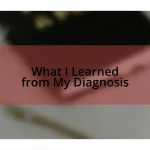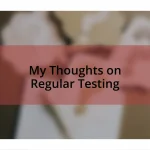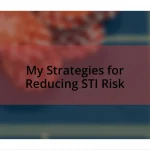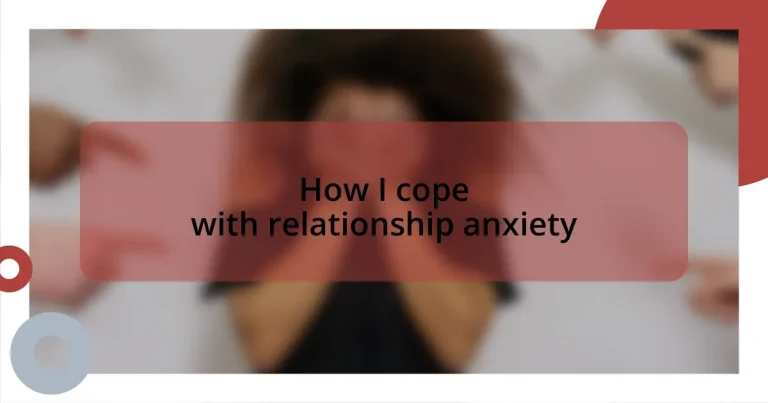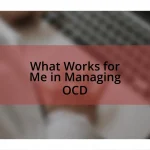Key takeaways:
- Relationship anxiety stems from past experiences and the desire for emotional security; acknowledging and understanding these roots is crucial for navigating anxiety.
- Effective coping strategies include mindfulness, expressive writing, open communication, and engaging in physical activity to manage anxiety levels.
- Enhancing communication with a partner fosters deeper connections and understanding, making it easier to share insecurities and fears.
- Seeking professional help can provide valuable insights and support, reinforcing the importance of mental health for personal and relational growth.
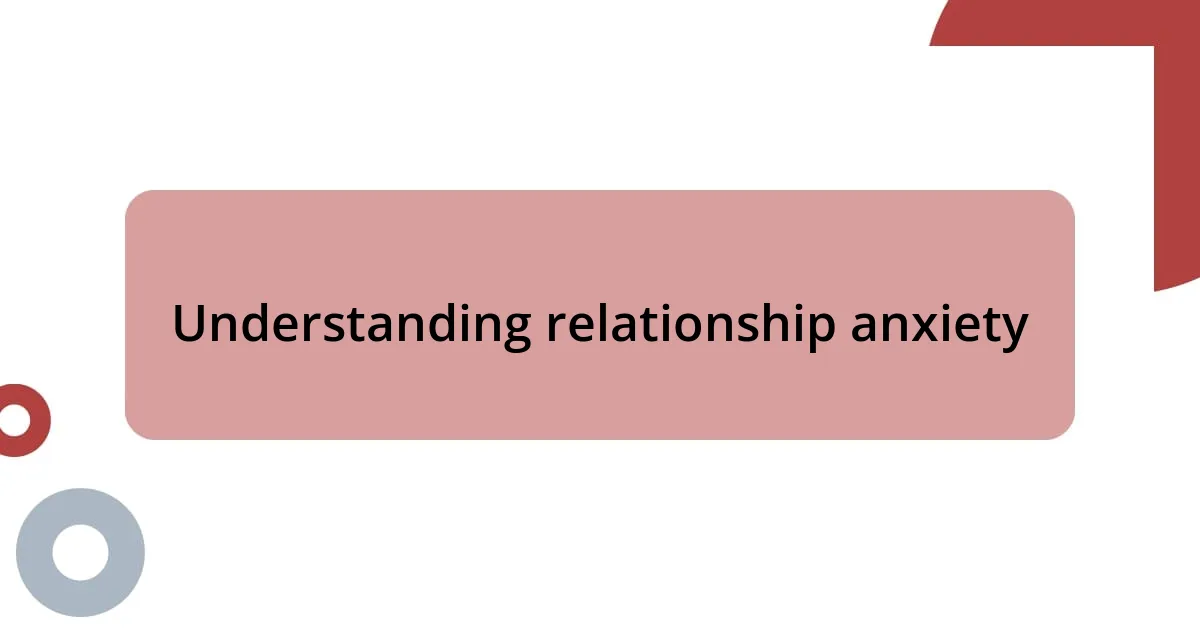
Understanding relationship anxiety
Relationship anxiety can often feel like an unsettling companion, whispering doubts and insecurities into our minds. I remember a time when even a simple text would send my heart racing—what did they mean by that? The fear of misinterpretation can be gut-wrenching, and it makes me wonder: why do we let our minds conjure up worst-case scenarios?
It’s essential to recognize that relationship anxiety stems from a mix of past experiences and our desire for emotional security. I can recall times when I felt abandoned, which fed my anxiety in new relationships. It’s interesting how our minds cling to past hurts, isn’t it? A single negative experience can cast a long shadow over our ability to trust and connect.
Sometimes, I find myself caught in a loop of analyzing every interaction, and it makes me question: is this helpful or harmful? While it’s normal to seek clarity, overthinking can paralyze us. Balancing the line between healthy concern and crippling anxiety is tricky, but understanding the roots of my feelings has helped me navigate these turbulent waters more effectively.
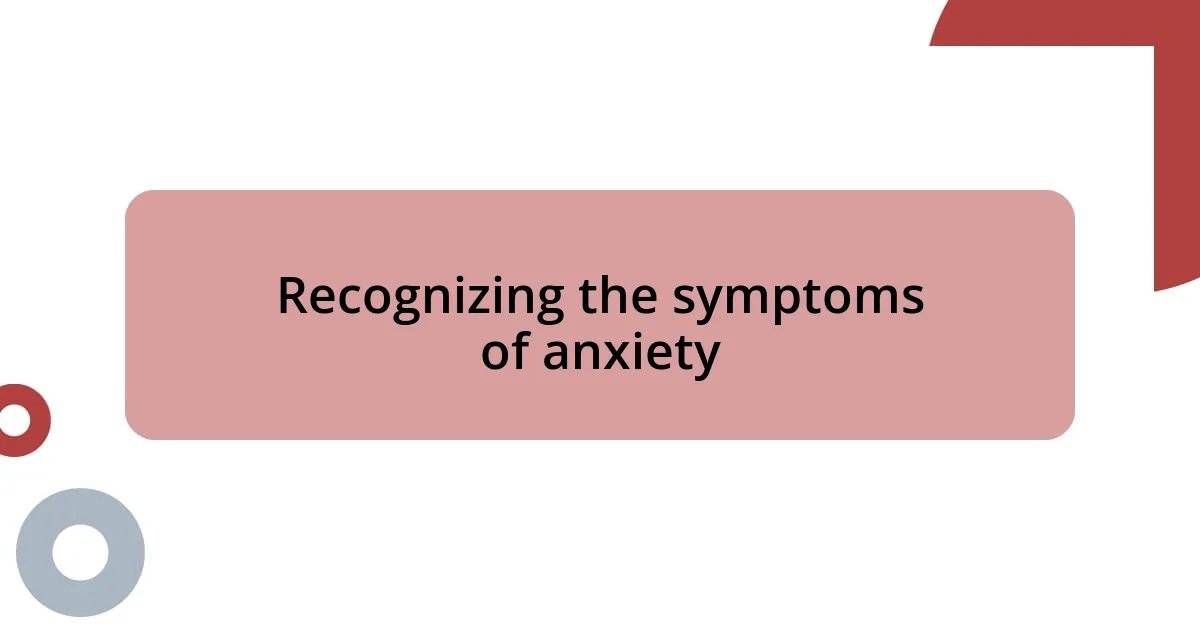
Recognizing the symptoms of anxiety
Recognizing the symptoms of anxiety is crucial for managing it effectively. One common sign I’ve noticed in myself is an overwhelming sense of dread, often tied to uncertainty in my relationships. I remember feeling a tightness in my chest during conversations that seemed casual—was it something I said? That physical reaction often clued me in that anxiety was creeping in uninvited.
Another symptom I’ve become aware of is the tendency to withdraw from my partner during high-stress moments. Instead of reaching out for support, I sometimes shut down, convinced that isolating myself is the best way to handle my worries. One time, I chose to avoid a crucial discussion because I just couldn’t face the potential outcomes. It wasn’t until later that I realized this avoidance only exacerbated my anxiety, leaving me feeling more disconnected than ever.
It’s fascinating how these symptoms can manifest differently for everyone. I’ve found that keeping track of my feelings through journaling has highlighted patterns in my anxiety responses. Acknowledging feelings like irritability or constant worry has been enlightening, allowing me to pinpoint when my anxiety levels rise. Observing these cues is the first step toward addressing the underlying issues with awareness and compassion.
| Physical Symptoms | Emotional Symptoms |
|---|---|
| Chest tightness | Overwhelming dread |
| Tension headaches | Irritability |
| Restlessness | Feeling disconnected |
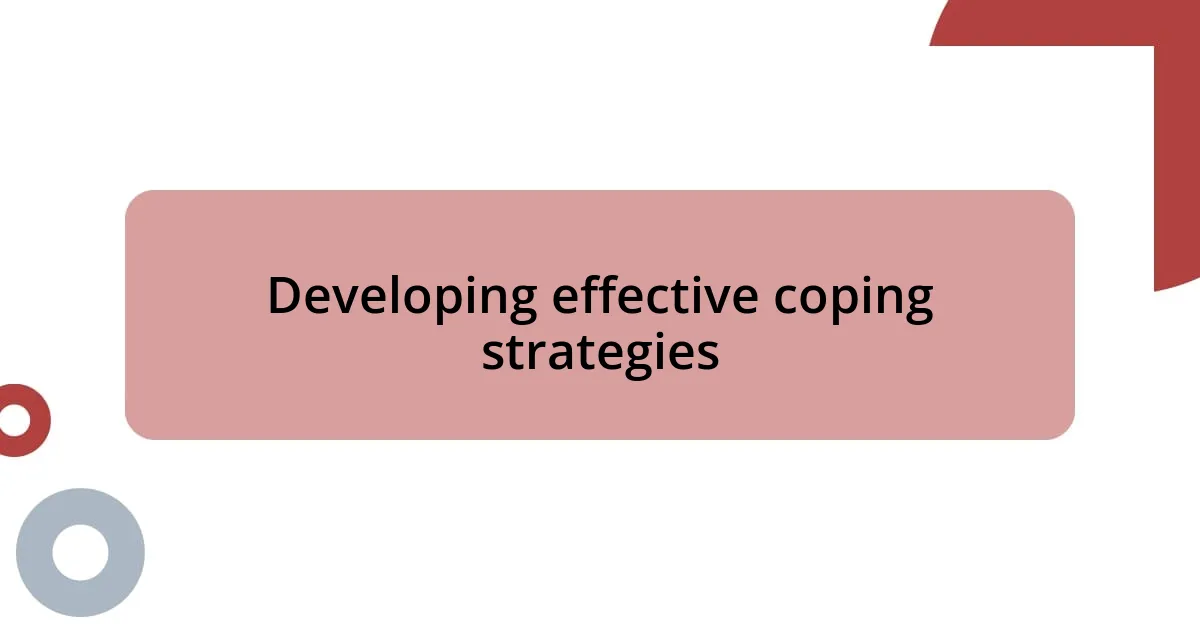
Developing effective coping strategies
When I set out to develop effective coping strategies for my relationship anxiety, I had to embrace a mix of self-awareness and action. One method I’ve found particularly valuable is grounding myself in the present moment. During those times when my mind races ahead, I remind myself to take a deep breath and focus on what’s happening right now. For me, this has meant rediscovering simple rituals like making a cup of tea or taking a short walk outdoors. These moments allow me to reconnect with my surroundings and ease the intensity of my worries.
Here are some strategies that have resonated with me:
- Mindfulness Meditation: Practicing mindfulness helps me stay present, creating a buffer against anxious thoughts.
- Expressive Writing: Jotting down my feelings has been cathartic, allowing me to process emotions without judgment.
- Open Communication: I’ve learned to speak openly with my partner about my anxieties, which fosters understanding and support.
- Positive Affirmations: I remind myself of my worth and the strength of my relationship, helping me combat negative self-talk.
- Physical Activity: Engaging in regular exercise not only lifts my mood but also helps alleviate stress and anxiety.
I’ve discovered that balancing these strategies is key. Sometimes, I find myself leaning more on journaling, while other times, it’s a good talk with a friend that does the trick. What I’ve come to appreciate is the flexibility these methods provide – they adapt to my needs as my feelings ebb and flow. Through this trial and error, I realize that coping with relationship anxiety isn’t a one-size-fits-all approach, but rather a collection of tools to help me find my footing amid the uncertainty.
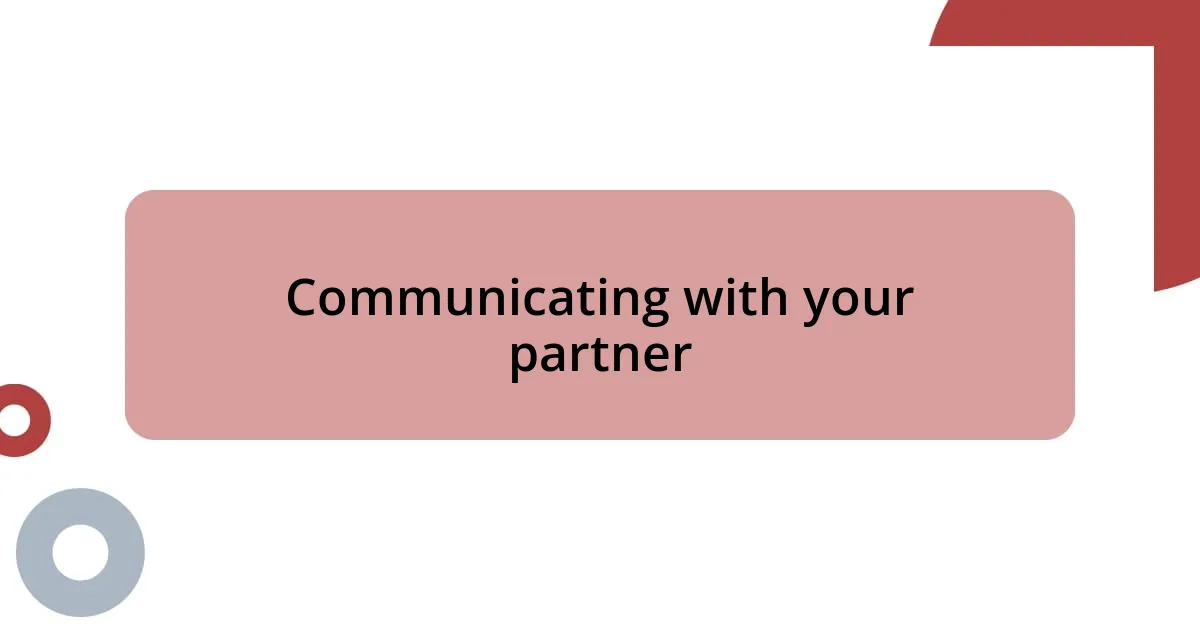
Communicating with your partner
When I started addressing my relationship anxiety, one of the most effective changes I made was enhancing my communication with my partner. Early on, I realized that bottling up my concerns only created distance between us. There was this one night when I felt an overwhelming urge to share my worries about our future together. I hesitated, thinking, “What if my partner sees me as insecure?” But once I finally expressed my fears, I felt an immense weight lift from my shoulders. Isn’t it liberating to realize that honesty can pave the way for deeper connection?
Opening up about my anxiety led to some truly heartwarming conversations. I remember one particular dialogue where I shared my fear of not being enough. To my surprise, my partner responded with vulnerability of their own, sharing their own insecurities. That moment reinforced how communication is a two-way street. It’s not just about voicing my worries but also inviting my partner to share theirs. Doesn’t it feel great to know that we’re on this journey together?
I’ve learned that timing matters in communication. Choosing the right moment—like after a cozy dinner rather than during a stressful day—can make all the difference. There was a time I tried to bring up my anxiety right before an important event, and it spiraled into a misunderstanding instead of a supportive discussion. By being intentional with our conversations, I’ve seen our bond grow, as each dialogue opens up a new layer of understanding between us. So, how do you approach communicating your feelings?
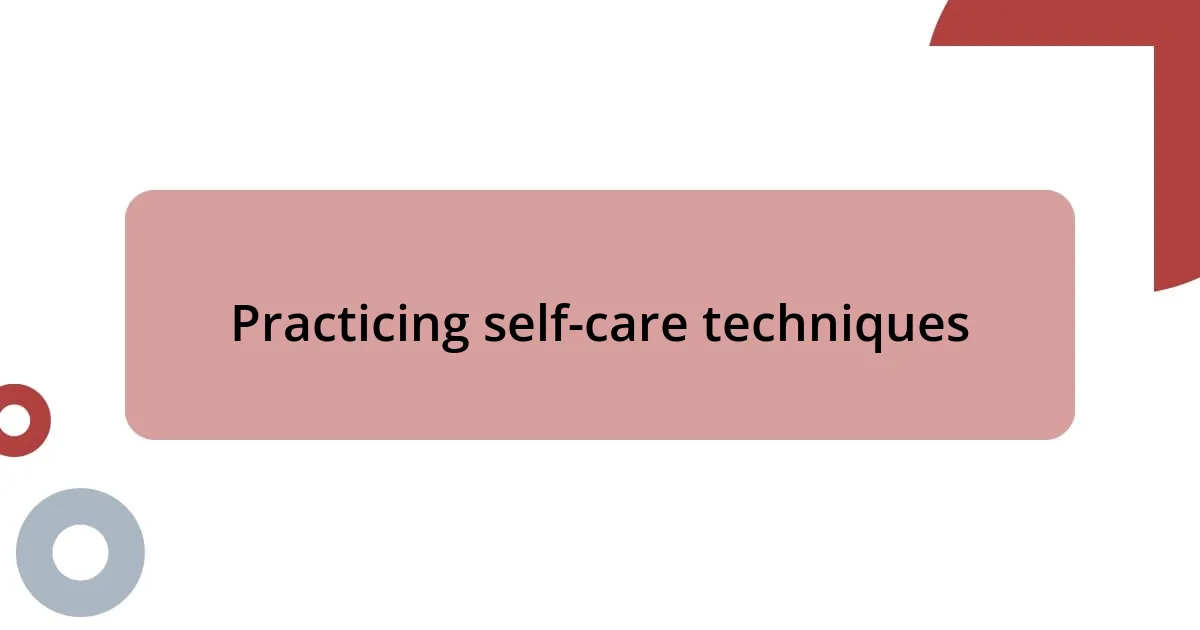
Practicing self-care techniques
When it comes to practicing self-care techniques, I can’t overstress how crucial it is to nurture your mental health. One of my go-to strategies is creating a calming sanctuary in my home. I remember a particularly overwhelming week when I decided to transform a small corner of my room into a cozy reading nook. With soft lighting, a comfy chair, and my favorite books, I had a perfect escape where I could recharge. Isn’t it amazing how a simple space can have such a profound impact on our well-being?
Another technique that has worked wonders for me is setting aside time for creative expression. I’ve found solace in painting, even though I wouldn’t call myself an artist by any means. There was one evening I let my feelings flow onto the canvas, and to my surprise, the act of splashing colors together became a source of release. It’s interesting how sometimes we don’t realize what we need until we dive into creative outlets. Have you ever experienced that freeing sensation of putting pen to paper or brush to canvas?
Connecting with nature is also a self-care practice I cherish. I often make it a point to go for a run in the park or simply sit in my backyard, enjoying the fresh air. During a recent visit to a local nature trail, I felt a sense of tranquility wash over me as I listened to the rustling leaves and chirping birds. It reminded me that the outside world has a healing energy that can ground us, pulling our focus from anxious thoughts. Wouldn’t you agree that sometimes the best therapy is just being present in nature? Each of these self-care techniques has played a vital role in how I cope with relationship anxiety, offering me moments of respite and clarity when I need them the most.
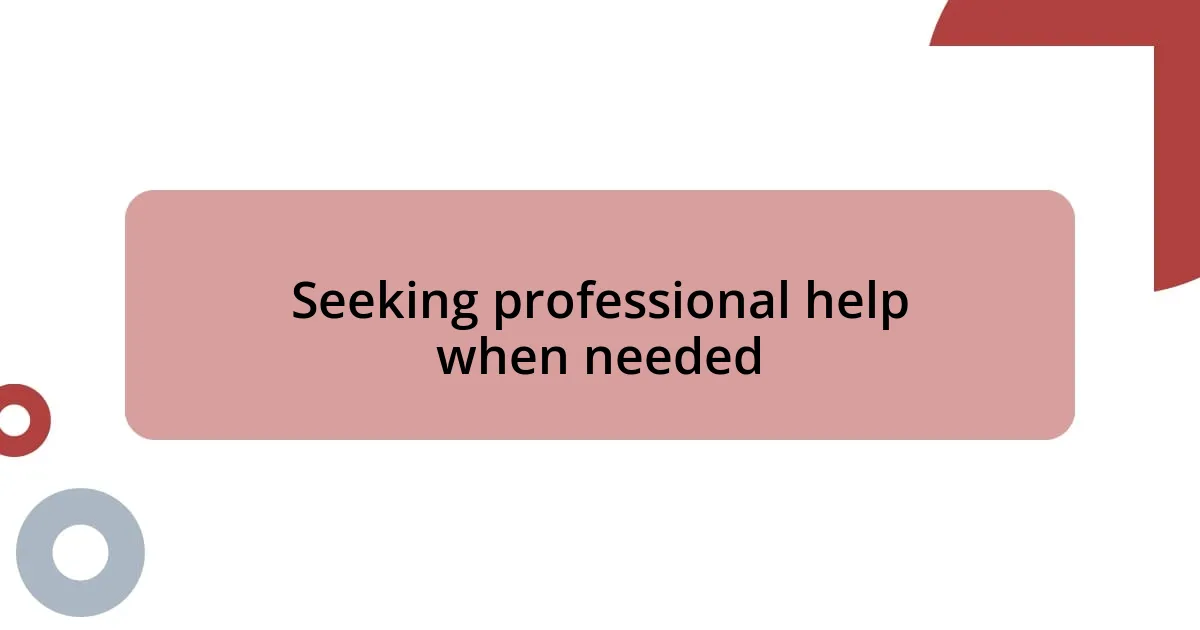
Seeking professional help when needed
There have been times when I realized that my relationship anxiety was reaching a point where I couldn’t manage it alone. It was after a particularly tumultuous week of sleepless nights and endless overthinking that I decided to seek professional help. The relief of talking to someone who could provide a fresh perspective was immense. Have you ever experienced a moment when just sharing your feelings made everything feel a bit lighter?
Finding the right therapist was a journey in itself. I remember researching various options until I found someone who specialized in relationship dynamics. The first session felt a bit nerve-wracking; I wasn’t sure how much of myself I was ready to share. However, as I delved into my experiences, the therapist’s validating responses made me realize that seeking help is a sign of strength, not weakness. Isn’t it empowering to think that reaching out can actually pave the way for personal growth?
Now, attending those therapy sessions has become a cornerstone of my coping strategy. Each visit fosters deeper insights into my feelings and behaviors, allowing me to approach my relationship with newfound clarity. I can genuinely say that investing in my mental health has strengthened not only my relationship but also my self-awareness. Have you ever thought about how just one conversation with a professional could change your entire outlook?
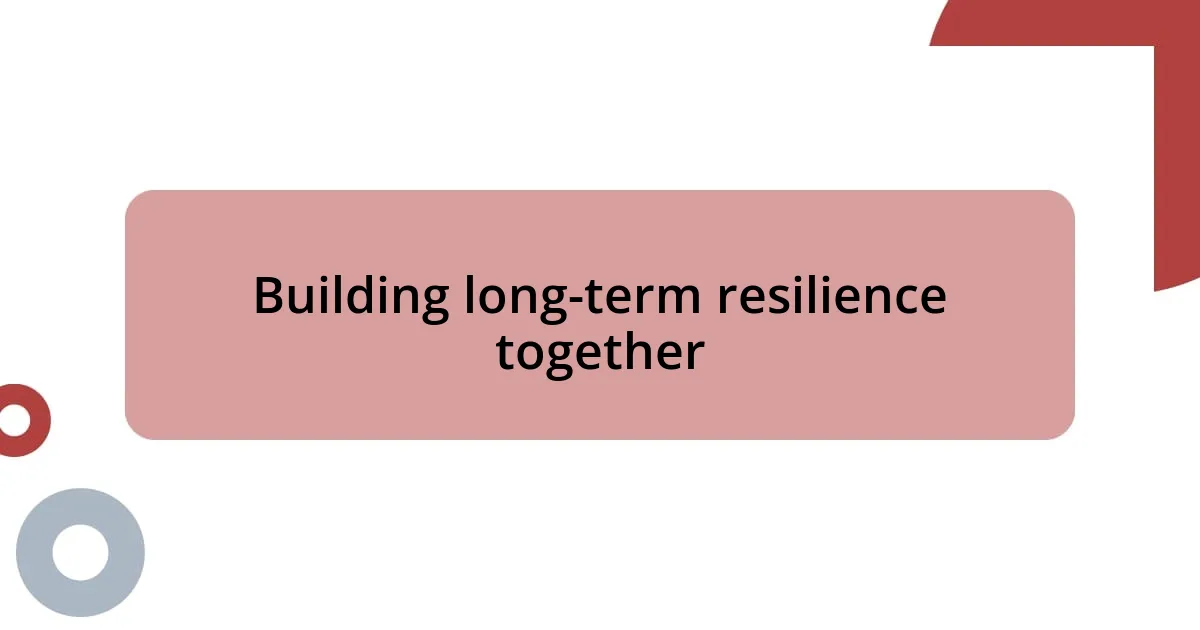
Building long-term resilience together
Building resilience in a relationship is an ongoing journey. I recall a moment when my partner and I faced a major conflict that left us both feeling vulnerable. Instead of spiraling into anxiety, we chose to confront our feelings openly. I remember us sitting down with a warm cup of tea, dialoguing not just about the issue at hand, but about how we could improve our communication moving forward. Isn’t it incredible how tackling challenges together can deepen your partnership?
Education has also played a significant role in building long-term resilience for us. We decided to attend relationship workshops together, which provided us tools to navigate tough times. One memorable session focused on active listening, where I learned how simply giving my partner my full attention made him feel valued. This experience reinforced the notion that understanding each other’s perspectives fosters a stronger bond. Have you ever felt the difference it makes when someone truly listens to you?
Lastly, I’ve found that practicing gratitude regularly has profoundly impacted our relationship’s strength. We established a simple ritual of sharing three things we appreciate about each other every week. There was a time when it felt just like another task, but then I found myself genuinely reflecting on the small things that brought joy into our lives. It’s amazing how acknowledging what you love in your partner can buffer against the stress that brings anxiety into the relationship. What if I told you that this simple practice could be a game changer for lasting emotional resilience?

